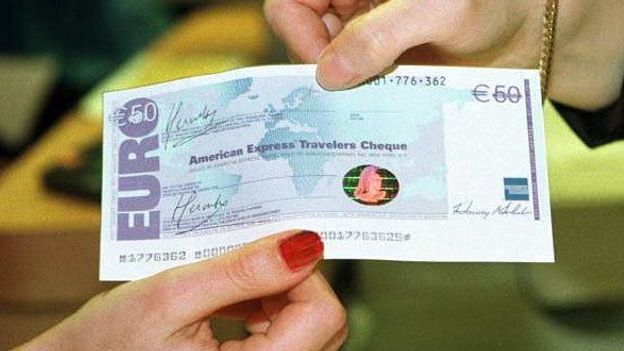A traveler’s check, also spelled “cheque,” is a form of currency that was traditionally used by tourists as an alternative to carrying cash when traveling abroad. It was designed to provide a secure and convenient way for travelers to make purchases or obtain local currency while minimizing the risks associated with carrying large amounts of cash.
These checks were issued by banks or financial institutions and offered a level of security against loss or theft. If a traveler’s check was lost or stolen, the issuing party would typically provide a replacement or reimbursement, ensuring the traveler’s funds were protected.
However, with the rise of credit cards and prepaid debit cards in the late 1980s, the popularity of traveler’s checks has significantly declined. These newer forms of payment offer greater convenience, wider acceptance, and often provide additional benefits such as rewards or insurance coverage. As a result, traveler’s checks are now considered outdated and are rarely used in modern travel transactions.
How Traveler’s Check Work
Traveler’s checks function as a prepaid form of currency, typically issued by major financial institutions. When purchasing traveler’s checks, the customer pays a fixed amount and receives checks of equal value in return. These checks can be used by the customer to make purchases or pay for services while traveling.
One of the advantages of traveler’s cheque is their resemblance to cash. They are widely accepted by merchants and service providers, allowing travelers to use them as a convenient and secure means of payment. In addition to making purchases, travelers can also exchange their checks for local currency at banks or authorized exchange locations.
Historically, traveler’s cheque were commonly sold by banks and credit unions. However, the availability of traveler’s checks has significantly declined in recent years, with fewer institutions offering them for sale. This decline is largely due to the widespread acceptance and convenience of alternative payment methods such as credit cards and prepaid debit cards.
Traveler’s cheque are available in various fixed denominations and are offered in multiple currencies. This feature makes them particularly useful in countries where exchange rates may vary significantly. Unlike other forms of payment, traveler’s checks do not have an expiration date, providing flexibility for future use.
One notable advantage of traveler’s cheque is their independence from a customer’s bank account or credit line. This characteristic ensures that the checks do not contain any personally identifiable information, minimizing the risk of identity theft. To enhance security, traveler’s cheque employ a dual signature system. Upon purchase, the customer signs the checks, and they must sign them again when cashing or using them. This mechanism aims to prevent unauthorized individuals from utilizing the checks and ensures that only the original purchaser can access their funds.
In the past, traveler’s cheque were widely accepted as a cash equivalent by banks, hotels, and retailers, although some banks may have imposed fees for cashing them. However, due to the global popularity of credit cards and prepaid debit cards, such as the Visa TravelMoney card, which provides protection against unauthorized use, it has become increasingly challenging to find establishments that are willing to cash traveler’s checks.
Where to Get Traveler’s Cheque
Traveler’s cheque can still be obtained from various companies such as American Express, Visa, and AAA. These companies may charge a purchase fee ranging from 1% to 2%. AAA members can acquire traveler’s checks without a fee at most AAA offices through the Wells Fargo Foreign Currency service. In recent years, AAA has shifted towards offering prepaid international Visa cards instead of traditional paper checks.
In the United States, American Express locations are the primary source for traveler’s checks. They can also be purchased online from the American Express website, but registration with an account is required. Visa offers traveler’s checks at Citibank locations across the country, as well as at several other banks.
Where to Cash Traveler’s Cheque
If you prefer to convert your traveler’s checks into cash instead of using them directly, there are several options available. One common method is to deposit them at your bank like you would with any other check. Additionally, many hotels or resorts offer the service of cashing traveler’s checks for their guests without charging any fees.
American Express offers a convenient online service for redeeming the traveler’s checks they issue. Through this service, you can have the funds deposited directly into your bank account. The online redemption application is designed to be quick and straightforward, typically taking less than 15 minutes to complete.
Alternatives to Traveler’s Cheque
There are several alternatives to traveler’s checks that offer convenience and security when traveling. One option is to use a credit or debit card issued by a bank that has worldwide acceptance and low or no foreign exchange fees. This allows you to make purchases and withdraw cash from ATMs without the need for traveler’s checks.
If your bank doesn’t provide favorable terms or charges high fees, prepaid travel cards are a modern alternative to traveler’s checks. These cards allow you to load them with funds and use them like a regular debit card, making purchases and withdrawing cash from ATMs. They provide the advantage of not being linked to your bank account, reducing the risk of financial loss in case of theft or loss.
Credit cards also offer similar or better protection, but if you prefer not to use your everyday card while abroad, dedicated travel cards can be a suitable choice. Visa and MasterCard offer prepaid cards specifically designed for use abroad, which can be obtained online, through travel agents, or from banks and credit unions. These travel cards typically have features such as low ATM fees, technology for seamless use in foreign countries, emergency cash services, and fraud protection with “zero liability” coverage.
It’s important to note that prepaid cards may have associated fees, so it’s advisable to compare them with your existing cards to determine if a travel card is the most cost-effective option for you.
For U.S. citizens residing abroad for extended periods, maintaining checking and other bank accounts in the United States can offer various advantages, and many checking accounts cater to foreign transactions, providing ease and flexibility in managing finances.
Where Do You Buy Traveler’s Check?
Traveler’s checks can still be purchased from reputable financial institutions such as American Express, Visa, and a few other providers. To acquire traveler’s checks, you can either visit a physical location or access the website of the issuing institution. It is important to note that you may be required to provide a valid photo identification in order to establish an account and complete the purchase process.
How Do You Cash Traveler’s Check?
Cashing traveler’s checks can be done at various establishments such as hotels, resorts, and currency traders, who typically provide local currency in exchange. However, it is worth noting that the availability of places willing to cash traveler’s checks has declined in recent times due to the increasing popularity of credit and debit cards.
What Do You Do With Traveler’s Check?
Traveler’s checks serve as a secure means of carrying money during international travel. They can be cashed at various businesses within the tourism industry or deposited into a bank account. The advantage of traveler’s checks lies in their replaceability, reducing the risk of theft or loss. However, the popularity of traveler’s checks has diminished as credit cards and prepaid debit cards offer greater convenience for travelers.







